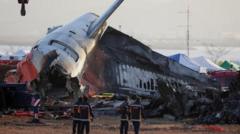Investigators are facing challenges in understanding the Jeju Air crash due to the absence of crucial data from the flight recorders, which halted four minutes before the incident.
Investigation Deepens as Critical Data Remains Unavailable from South Korean Air Crash

Investigation Deepens as Critical Data Remains Unavailable from South Korean Air Crash
Authorities probe the Jeju Air disaster that claimed 179 lives, with incomplete information hampering efforts.
Flight data and cockpit voice recorders from last month's Jeju Air disaster, which tragically took the lives of 179 individuals, have been reported to have ceased operation just moments before the fatal event. This crash, marking the deadliest in South Korean history, only spared two cabin crew members.
The South Korean Ministry of Transport expressed concern regarding the "black boxes," which failed to capture the critical moments leading up to the accident. The relevant data was originally examined domestically but later shipped to the U.S. for further analysis once the gaps were identified.
On December 29, while en route from Bangkok, the Boeing 737-800 crash-landed at Muan International Airport, making contact with the runway approximately a third of the way down, reportedly without its landing gear deployed, before skidding into a wall and igniting.
Sim Jai-dong, a former investigator with the transport ministry, remarked on the unexpected loss of data from the last moments of the flight, indicating a possible failure in power, including auxiliary systems. Investigators are diligently exploring various factors that might have contributed to the incident, such as the potential impacts of a bird strike and adverse weather conditions.
Meanwhile, the aviation community is questioning the circumstances surrounding the absence of landing gear during the landing attempt. The pre-flight checks preceding the ill-fated journey reportedly indicated no concerns, leaving many unanswered questions for the families of the victims awaiting closure.






















